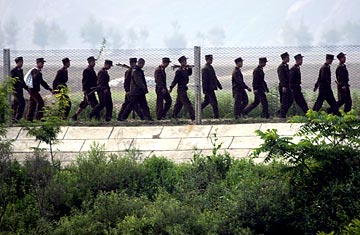
North Korean soldiers march along the North Korean side of the border fence near Dandong, China
(2 of 2)
The tension in Beijing's North Korea policy stems mainly from the fact that China prefers North Korea to exist, even in its impoverished and infuriating current form, as opposed to what it sees as the other possibility: a unified Korean peninsula that at minimum slouches toward the U.S., if it doesn't become an outright U.S. ally under Seoul's direction. Klingner says Beijing has feared a North Korean implosion for years, in the manner of East Germany, that would come with costs both economic (refugees coming across the Chinese border) as well as diplomatic (the loss of a buffer state in a region that, though stable, is inhabited by countries that really don't like one another much.)
The costs to Beijing of kicking the North Korea can down the road by negotiating endlessly within the six-party talks were, with Washington's support, minimal. But now Beijing has plainly lost face; as Romberg says, it has probably been humiliated by Pyongyang. That's why diplomats in the region say there may be hope that the U.N. Security Council might seriously up the ante. Beijing's initial, tepid reaction to Monday's blast — waiting several hours before issuing a statement "condemning" the test — has been toughened, and discussions at the Security Council about possible sanctions are now under way.
How will the world know if Beijing has had a change of heart relative to its neighbor? Diplomats and intelligence sources say the evidence will come in two phases. In April, after the missile launch, Beijing did not stand in the way when three North Korean companies were moved from a U.S. sanctions list to a U.N. sanctions list — meaning that all nations are obliged to cut off business ties to those companies. The breadth of the sanctions now is likely to be much wider: not only must Beijing not run interference for North Korea, diplomats say, it needs to actively enforce whatever measures the U.N. does eventually pass.
This would not be unprecedented. A few years ago, sources note, Chinese state-owned banks did actively enforce U.S. financial sanctions against the North — the only measures that plainly hurt the top North Korean leadership — precisely because not doing so would have cost them access to the U.S. and international capital markets. "Again, it was a cost-benefit choice for them, and in that case, it was clear the costs were much worse than the benefit of standing by Pyongyang," says a former U.S. intelligence official. Washington ultimately dropped those sanctions in lieu of a diplomatic effort to entice North Korea to give up its nukes.
That effort will now at least go into abeyance, if only because Pyongyang clearly has no interest in accepting U.S. Secretary of State Hillary Clinton's invitation, issued this week, to return to the six-party talks. South Korean President Lee Myung Bak in Seoul flatly told President Obama earlier this week not to go back to simply trying to bribe the North out of its nuclear program. Japan is more or less in the same place. China, which could inflict considerable economic pain on Pyongyang by cutting off trade and fuel shipments, now must decide whether or not, in truth, a nuclear North is against its "core interests." And it must do so with the world very much watching. Expect a senior envoy from Beijing to fly to Pyongyang at some point in the next few weeks or so for a conversation that will be anything but polite.
